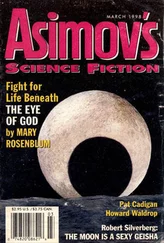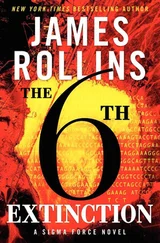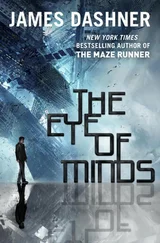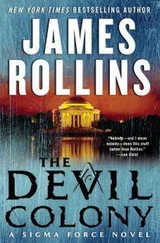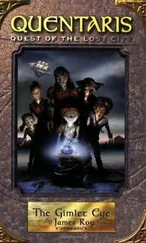Green fire sparked to life, reflecting off the water.
He prayed someone would see it.
Someone did.
To the right, the North Korean helicopter burst out of the forest. Thumping loudly, it swung out over the water and sped back toward them, drawn by the sputtering flare.
Its guns chugged to life.
Then a flash of fire winked out in the darkness beyond the cove, accompanied by a furious whistling. A hellfire missile slammed into the side of the helicopter and exploded, shattering the chopper into fiery ruin.
Ducking from the deafening boom, Gray watched flaming debris rain into the forest, while the scorched bulk of the aircraft fell heavily into the sea.
Even before the blast echoed away, a small aircraft sped through the smoke and drew to a hover over the beach. It was a new design of stealth aircraft, a miniature version of a U.S. Blackhawk helicopter, with harsh angles and flat surfaces meant to confound radar.
But the fiery blast would not go unnoticed for long.
With its missile pod still smoking, the helicopter lowered to the beach and the doors opened to receive them.
Gray had arranged this extraction with Kat earlier. As planned, the stealth aircraft had taken off from a U.S. ship parked in South Korean territorial waters and flown low over the waves to the beach. Kat had warned that this was a onetime deal, requiring perfect timing. The North Koreans wouldn’t fall for it twice.
As his team clambered into the chopper, a crew member slammed the door shut behind them. The helicopter immediately turned its back on the Korean peninsula and sped away, whisking over the water, its blades whispering through the night.
Strapping in, Gray looked toward the shore, weighing all the risk and bloodshed. As he settled back, he saw Guan-yin reach from her seat toward Seichan.
For the first time in decades, a mother gently touched her fingertips to her daughter’s cheek.
Gray turned around, staring forward now.
It had been worth it.
15
November 18, 9:41 P.M. QYZT
The Aral Sea, Kazakhstan
As the Eurocopter lifted in a swirl of salt and sand, Rachel worried about her uncle. He was deep in conversation with Josip, their heads bent together, seated next to each other, like excited schoolboys about to head out on a field trip. But neither of them were boys .
Especially Vigor.
Though he put on a strong façade, age was beginning to crack through that veneer. She saw it as he climbed into the helicopter a moment ago, needing an extra hand, when in the past he could have vaulted inside. She had noted it in a thousand different ways before this trip, even commented upon it a couple of months ago, but he had dismissed her concerns, blaming it on the time he spent now at a desk versus out in the field. She suggested he lighten his schedule, take on fewer responsibilities at the Vatican, but that was like asking a freight train with a full head of steam to slow down.
During this trip, she had grown even more concerned. Prior to this mission, she hadn’t seen as much of her uncle as she would have liked, just the occasional family dinner or holiday. But now, spending the past twenty-four hours with him, she feared it was more than age. She had noted the dark circles under his eyes back at his university office. She now saw how he breathed heavier, how he sometimes clutched his left side. But whenever he caught her looking, he dropped his hand.
He was not telling her something.
And it terrified her, even more than the end of the world.
After her father had died in a bus crash, Vigor had filled that void. Under his care, knowing she was hurting, he had taken her by the hand and kept her moving, exploring Rome’s museums, going on outings to Florence, diving at Capri. He taught her to pursue her passion, never to settle for less as a woman. He had also instilled in her the respect for and love of history and art, where the greatest expressions of humankind were cemented in marble and granite, oil and canvas, glass and bronze.
So how could she not want to protect him? Back in Rome, fear had made her want to bottle him up, to shelter him from harm, even against his will. But as she watched him now, smiling and excited, she knew she had been wrong. She didn’t know how many years she had with him, but she recognized it was time now for her to take his hand, to be the one to offer him strength when he needed it, to keep him moving.
He had given her the world—she could never take it from him.
Knowing that, she turned her attention to the blasted landscape below. The helicopter banked away from the rusted ship and turned to the north, headed for a region even more desolate and barren. Moonlight turned the baked salt flats into an endless silver expanse, broken by boulders, the decaying hulks of other ships, and the occasional chalky hill.
She pictured the seas refilling the basin below, swamping over the flatlands until the hills became islands again. They were headed to such a spot about forty kilometers to the northeast, a lone atoll in this ocean of dry salt and dust—all based on a map inked on the tongue of a dead conqueror.
She could not help but feel some of her uncle’s excitement spark inside her. What might they find? The others looked equally enthused, even the reluctant Jada Shaw. She shared a window with Duncan, a new Sigma operative, both equally young. Their eagerness shone from their skin.
Monk caught her staring and smiled, as if to say, remember when we were so young. He now had two girls at home and a wife who loved him, and he wore his scars proudly. Even his prosthetic hand was a badge of honor.
She sank back into her seat, happy for the company around her, even the young Sanjar, who carried his falcon on his wrist, held close to his body. Its plumage was a striking silvery white, accented with stripes of black and slate gray.
He noted her attention and nodded.
“What type of bird is he?” she asked.
Sanjar’s back straightened, happy for her interest. “He is a gyrfalcon. Falco rusticolus . One of the largest falcon breeds.”
“He’s beautiful.”
He grinned, showing a flash of white teeth. “Best he not hear that. Heru is already quite full of himself.”
“But he sits so still.”
He ran a finger over the top of a tufted bonnet. “Without sight, a bird knows not to move. A hooded falcon will remain motionless, trusting his handler. In the past aristocrats used to carry them to court, to banquets, even on horseback.”
“And apparently now on helicopters.”
“We must all adjust to the modern world. But falconry goes back to the time of Genghis Khan. Mongol warriors used to hunt foxes, even sometimes wolves, with falcons.”
“Wolves? Truly? Something so large.”
He nodded. “Not just wolves . But humans, too. In fact, Genghis’s personal bodyguards were falconers.”
“Then you are keeping up a proud tradition, Sanjar, continuing to look after Genghis even today.”
“Yes, my cousin and I”—he nodded to Arslan in the next row of seats—“we are very proud of our great ancestor.”
The pilot interrupted. “Folks, we’re a minute or so out from the designated spot. Do you want me to land or circle for an aerial view?”
Vigor answered, leaning forward. “From the air, please, that might prove useful.”
They all turned their attention to the windows as the helicopter swept over the Aralkum Desert, the salt marsh glistening even brighter here. Ahead, a gloomy peak broke through the dried crust. It was steep sided and wind carved, slightly concave on the top, looking not unlike a boat riding a wave of rock.
The helicopter circled it twice, but nothing of note struck anyone.
Читать дальше

